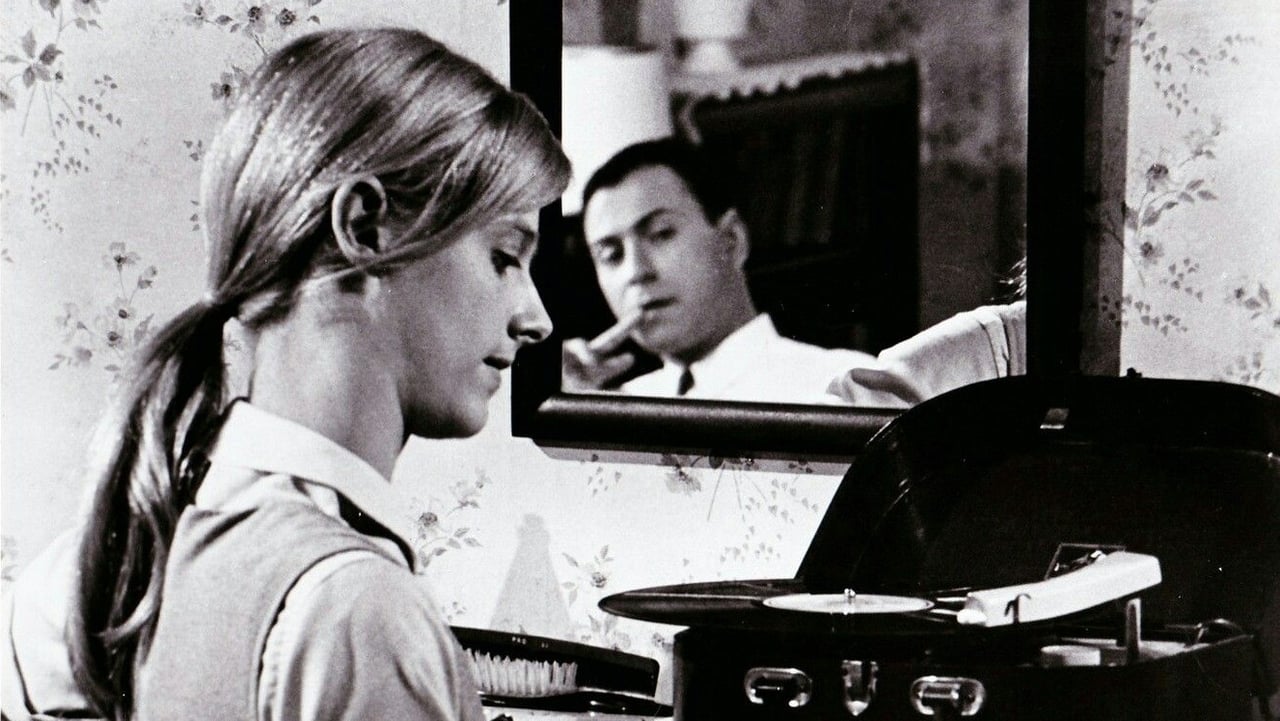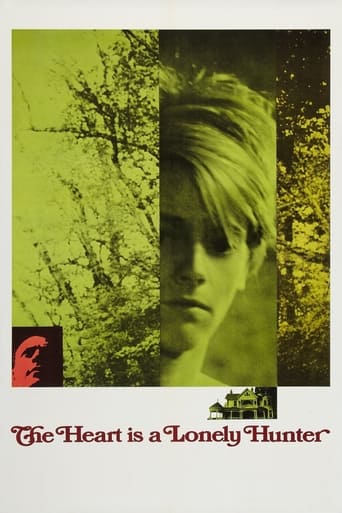

Let's be realistic.
... View MoreIt's hard to see any effort in the film. There's no comedy to speak of, no real drama and, worst of all.
... View MoreVery good movie overall, highly recommended. Most of the negative reviews don't have any merit and are all pollitically based. Give this movie a chance at least, and it might give you a different perspective.
... View MoreThere is, somehow, an interesting story here, as well as some good acting. There are also some good scenes
... View MoreI first watched this movie as a teenager and thought it was terrific. Now, at 62, I wonder what I saw in it. It is so poorly directed that it does not surprise that I have never heard of Robert Ellis Miller except for this film. He does not know how to get the most out of a scene, not even with extremely talented actors standing before him.Of course, this is not his fault entirely. The screenplay is unfocused with clumsy dialog and crowded with people who fail to mesh. The Percy Rodrigues character is particularly heavy-handed. The central relationship between Alan Arkin and Sondra Locke is never really established so that the stakes are virtually non-existent and the dramatic ending is less powerful and moving than simply curious and baffling.It troubles that such a well-intended endeavor should fall so far short of its objectives. Although I have never read Ms. McCullers' book, her work is familiar to me and I am certain her story would have benefited from more responsible planning.The cast can hardly be faulted. Arkin and Locke clearly earned their Oscar nominations for outstanding work, and Chuck McCann probably deserved one too. Arkin especially dominates, pulling more from his part with less to say than a multitude of more audible performers. He is miraculously eloquent. Cicely Tyson and Stacy Keach are also excellent, often rising above the indulgent lines the are given, in portrayals which suggest what lay ahead for them both.If everyone involved on this project had been as conscientious as these actors, the result would have undoubtedly been an infinitely richer achievement.
... View MoreThe book is so superior to this pale adaptation. The change to the sixties from the Depression era nineteen thirties hurts it terribly. Not a very good script, it just strips the entire mood of the book and simplifies it to a fault. The character of Singer in the novel is far more moving and complex. We feel his pain in the book at being everything to everyone while no one truly makes the effort to know him. They use him as a reflection of their own feelings and never think or consider his feelings. The time period change is a mistake. It was likely cheaper to film in the time period the film was made than to recreate the Depression era, but it drains the life out it. Read the book and you'll understand how much the Depression era time period, the world on the verge of WWII, adds to the story. The book is extraordinary in its interweaving of characters who are searching for meaning in their lives, with Singer at the center. If ever something cried out to be remade it is The Heart Is A Lonely Hunter. It needs to be done right on film.
... View MoreLet's talk first about the last, a non-Hollywood ending, but effective as was the entire beautiful, sentimental movie.The several stories in this excellent adaptation of the McCuller novel tie well together making the film as a whole one of the finest sentimental journeys ever put on screen.The atmosphere is letter-perfect. It is storytelling at its very best, and, oh, the acting is superb. No wonder Sandra Locke was nominated for an Academy Award. I don't know who won it that year, but I do know it should have been Miss Locke.Alan Arkin, as usual, is top notch in what must have been a difficult role. He is thoroughly convincing. Matter of fact, all of the performers were remarkably convincing.Chuck McCann who, I think was a comedian, certainly should be mentioned as well as, well, as everyone else.I had the pleasure of working with Stacy Keach when he was in the North Carolina Outer Banks doing a story with his brother, James, about the Wright Brothers. Both were great to talk with, and he was excellent in this film.This movie will grab you at the beginning, and it won't let go. It is a must-see. Keep the tissues handy.
... View MoreAlan Arkin is John Singer, a deaf mute who takes an interest in practically everything and everyone around him. He wants to be the legal guardian for the mentally disabled Chuck McMann, who is first seen breaking the window of a pastry shop so he can eat the displays. To be near McMann (who is committed for observation), Arkin rents a room from physically disabled Biff McGuire and his tired wife, Laurinda Barrett, and slowly becomes friends with their lonely teen-aged daughter (Sondra Locke). He also befriends drifter Stacy Keach, whom he first meets while Keach is causing a drunken disturbance in a greasy spoon. When black doctor Percy Rodriguez refuses to take care of the injured drunken Keach, Arkin begins to work on him. Rodriguez, who is angry both at white people, as well as blacks who don't try to rise above their station in life, at first resists Arkin's intrusion in his life. His daughter (the brilliant Cicely Tyson) has married a man he refers to as an "Uncle Tom". Later, she tells him basically that he acts more white than white people do after he refuses to help her husband out of a disastrous situation that results in catastrophe. It is only through compassionate Arkin that the two are able to come to an eventual understanding. At his boarding house, Arkin wins Locke's trust by using her love of classical music to win her trust. It is through his upbeat look at life that seems to bring the people around him (including the surprisingly wise and kind drifter Keach) any sense of hope.It appears that Arkin's disability is a metaphor for the emotional disabilities that all these people are hiding from the world. Locke is initially hateful towards Arkin, but grows to trust him as her parents become more distant because of their own growing bitterness's. McGuire (in the type of role that Arkin might have later played) is quietly understated as the injured father whose inability to work has caused the family financial hardship. Barrett's fall from tired, hard working wife to slightly embittered mother who wants her daughter to drop out of school and work full time (while taking night classes), is also nicely subtle. Their characters reminded me a bit of the parents in "Breaking Away". Rodriguez is outstanding as the embittered black doctor who only treats Keach because of his pity towards deaf Arkin. The scene where he admits how ironic it is that at this point in his life, it is a white man to whom he can confide his deepest feelings, is so quietly powerful. Ms. Tyson, of course, is excellent; Already a stage veteran, she makes her character quite believable and the love for her husband most admirable.Stacy Keach is only in the film briefly in the first half, but makes a nice impression as the multi-layered drifter who has become a social outcast that only Arkin understands. As for Chuck McCann, as Arkin's child-like friend, he seems to really become this character. It is apparent that Arkin would never be able to take care of him, revealed in a powerful scene where Arkin uses a box of Whitman's chocolates to lure the sweets loving McMann away from a cake to get him to a court hearing. Arkin's good intentions are more than admirable, but ultimately leads to a tragic conclusion that will rip your heart out.Sondra Locke, best known in the 70's as Clint Eastwood's on and off screen partner in movies like "The Gauntlet" and "Every Which Way But Loose", has her best role as the teen-aged Mick. As I looked more closely at her, I was stunned by her resemblance to Allison Arngrim ("Little House on the Prairie's" Nellie Olsen) in both looks and facial expressions. She greatly deserved the Oscar Nomination she received, because she makes what could have been an annoying character really quite likable. She's not movie star beautiful, but there is something very unique in her that makes her quite special here.Without a doubt, there is no other word to describe Alan Arkin's performance than amazing. He really studied this character inside and out to get every niche of him down. There is no moment of unbelievability in his portrayal. While he lost the Oscar to Cliff Robertson's equally brilliant performance in "Charly", it must have been a really close race. "The Heart is a Lonely Hunter" is a much better film that unlike "Charly" and many other films of the 60's doesn't add a strange "mod" feeling into it that makes no sense.There are some terrific moral lessons to be learned from films like "The Heart is a Lonely Hunter". The biggest for me, based upon the tragic ending, is that in life, it is not only what people do in their lifetime that makes them special, but what they add to the lives of others around them (particularly strangers) that matters. We can give all the kindness in the world to our family, friends and partners, but if we ignore the opportunity to help someone we haven't brought into our lives, it takes away from our importance while here on this earth. The ending may have been tragic, but what lessons that other characters learned from Arkin's John Singer would change their lives eternally. Something tells me that Mick (Locke) would end up in social services helping disabled people, and that the black doctor (Rodriguez) would never again distrust all white people and be open to helping everybody who came to him.
... View More